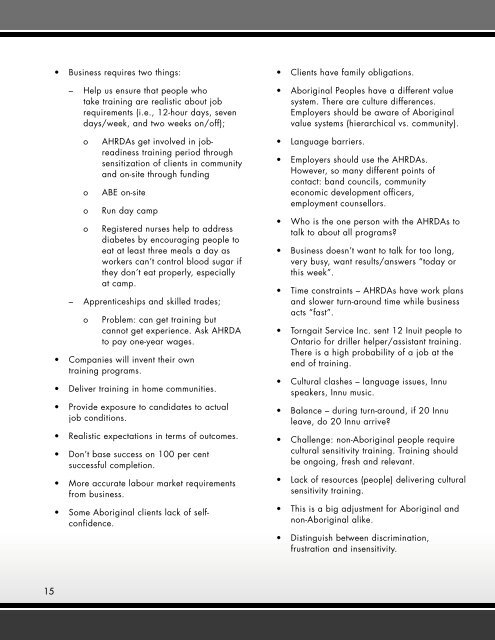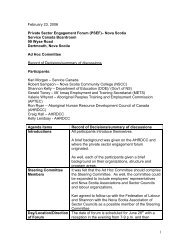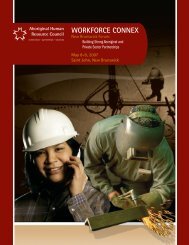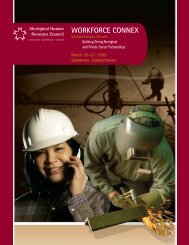Labrador - Aboriginal Human Resource Council
Labrador - Aboriginal Human Resource Council
Labrador - Aboriginal Human Resource Council
Create successful ePaper yourself
Turn your PDF publications into a flip-book with our unique Google optimized e-Paper software.
• Business requires two things:<br />
– Help us ensure that people who<br />
take training are realistic about job<br />
requirements (i.e., 12-hour days, seven<br />
days/week, and two weeks on/off);<br />
o<br />
o<br />
o<br />
o<br />
AHRDAs get involved in jobreadiness<br />
training period through<br />
sensitization of clients in community<br />
and on-site through funding<br />
ABE on-site<br />
Run day camp<br />
Registered nurses help to address<br />
diabetes by encouraging people to<br />
eat at least three meals a day as<br />
workers can’t control blood sugar if<br />
they don’t eat properly, especially<br />
at camp.<br />
– Apprenticeships and skilled trades;<br />
o<br />
Problem: can get training but<br />
cannot get experience. Ask AHRDA<br />
to pay one-year wages.<br />
• Companies will invent their own<br />
training programs.<br />
• Deliver training in home communities.<br />
• Provide exposure to candidates to actual<br />
job conditions.<br />
• Realistic expectations in terms of outcomes.<br />
• Don’t base success on 100 per cent<br />
successful completion.<br />
• More accurate labour market requirements<br />
from business.<br />
• Some <strong>Aboriginal</strong> clients lack of selfconfidence.<br />
• Clients have family obligations.<br />
• <strong>Aboriginal</strong> Peoples have a different value<br />
system. There are culture differences.<br />
Employers should be aware of <strong>Aboriginal</strong><br />
value systems (hierarchical vs. community).<br />
• Language barriers.<br />
• Employers should use the AHRDAs.<br />
However, so many different points of<br />
contact: band councils, community<br />
economic development officers,<br />
employment counsellors.<br />
• Who is the one person with the AHRDAs to<br />
talk to about all programs<br />
• Business doesn’t want to talk for too long,<br />
very busy, want results/answers “today or<br />
this week”.<br />
• Time constraints – AHRDAs have work plans<br />
and slower turn-around time while business<br />
acts “fast”.<br />
• Torngait Service Inc. sent 12 Inuit people to<br />
Ontario for driller helper/assistant training.<br />
There is a high probability of a job at the<br />
end of training.<br />
• Cultural clashes – language issues, Innu<br />
speakers, Innu music.<br />
• Balance – during turn-around, if 20 Innu<br />
leave, do 20 Innu arrive<br />
• Challenge: non-<strong>Aboriginal</strong> people require<br />
cultural sensitivity training. Training should<br />
be ongoing, fresh and relevant.<br />
• Lack of resources (people) delivering cultural<br />
sensitivity training.<br />
• This is a big adjustment for <strong>Aboriginal</strong> and<br />
non-<strong>Aboriginal</strong> alike.<br />
• Distinguish between discrimination,<br />
frustration and insensitivity.<br />
15









